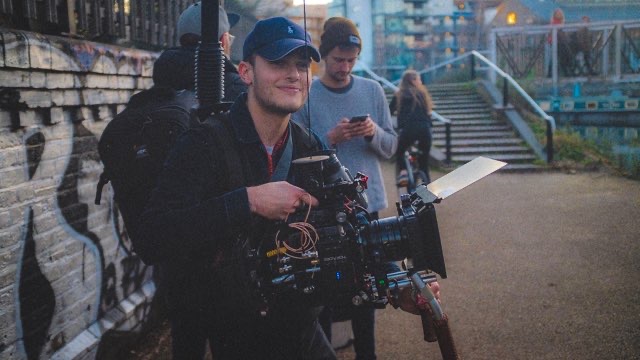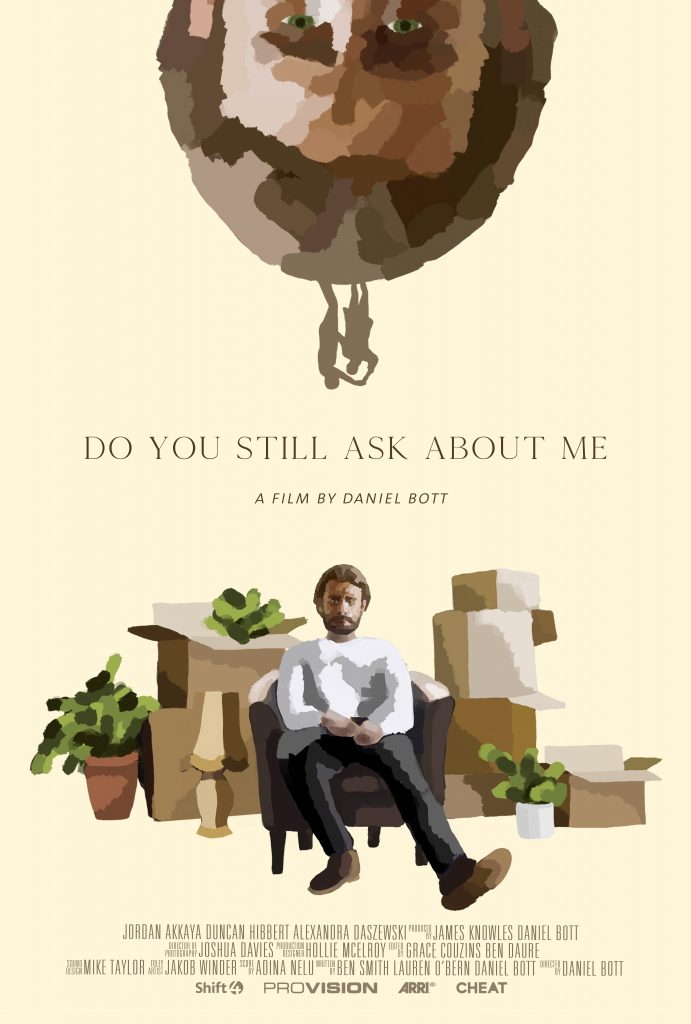Manchester has produced some of the biggest superstars in the film industry, from Trainspotting director Danny Boyle to acting royalty Ian McKellen and Ben Kingsley.
When they’re not being co-opted by Hollywood to double up as New York, its streets are still home to some of the most exciting emerging talents in the industry.
Daniel Bott fits this bill and some. The 22-year old writer and director from Greater Manchester has worked across both commercial and narrative work. His new short film, Do You Still Ask About Me? went from inception to completion over the past year of the pandemic. An introspective meditation on the break up of a relationship, it will be released later this year.
The cast and crew is a smorgasbord of Manchester-based creatives, including composer Adina Nelu and co-writer Lauren O’Bern. Sam Angell had his first film job on the short as a runner, and now works across TV in the North of England, a path that was far less viable before the boom in industry up North (“five years ago 90% of the work was in London, there isn’t as much work here, but it is changing now”).
The uptick in TV and film productions north of London has been promised for a long time, with the UK’s two main broadcasters, ITV and BBC, opening studios in the North in the past decade.
While TV studios might be making this shift, the film industry has been slower to move. Manchester’s streets are used for odd scenes in studio blockbusters, including Captain America: The First Avenger and Morbius, but the rest of filming is done elsewhere.
Do You Still Ask About Me’s producer James Knowles sees this as an infrastructure problem that will take some time to fix. “They keep saying it’s coming up North, when you’re north of Watford that’s what you hear constantly and it’s so exciting. But as soon as you go south of Watford people say it’s not going up North, it’s all here.
“Until such time as Manchester, Liverpool, Leeds have the studios and infrastructure that’s when we’ll see the larger studios like Disney coming up North.”
Whether the bigger studios are working here or not, that won’t stop indie productions from working industriously, to make exciting and innovative films from the belly and guts of the nation.
We spoke to Daniel to see where he started, what he aims for, and what really makes him tick.
When did you first get interested in filmmaking?
It’s not as generic as a lot of the directors and filmmakers I aspire to be, there was no film camera I used to play with as a kid or anything like that. I gravitated towards filmmaking through initially being enamoured with drama and theatre and different aspects of storytelling.
I originally wanted to act until I realised I was no good at it, then after rummaging through my grandma’s VHS cabinet and discovering E.T. and The Railway Children and some of the other classics that’s where I became obsessed with how to make films and tell stories and putting more emphasis on getting myself behind the camera and it just developed naturally from there.

What were the VHS’s of?
They were classics. We had a lot of Spielberg films and then we had some more niche films like The Indian in The Cupboard and The Railway Children, Indiana Jones. They were the kind of films I grew up on and I think that’s definitely reflected in the work I aspire to create, that level of escapism is definitely still with me today.
Is that thing you think you strive for the most when making a film? Is it escapism?
It’s definitely the escapism element and evoking kind of an emotional connection within the audience. Making things that feel quite intimate. I think it comes as a result of me being raised in a working class background with two disabled parents, I always strived for trying to do better for myself, and I was quite ambitious as a result of my background.
That level of escapism that I found in the dark in the cinema watching those Pearl & Dean introductions before a film, that’s what I wanted to recreate in my own work.
Is it a combination of connecting with your identity and past, your working class background, as well as combining it with an escapism? Do you think those two things can live in harmony?
One or either can be overpowering in cinema. You can put a lot of emphasis onto social class and a political stance, the message you’re trying to convey, and there’s definitely a space for that especially within independent film. That’s something I definitely encourage the exploration of.
I’ve just found myself personally that as a filmmaker I’m drawn to those subject topics through a different lens, focusing on different elements of fractured storytelling or just different narrative devices, more like hyperrealism and experimentation as opposed to just social class, social drama, gritty, very grey, I don’t think that was ever me.
I think that’s the kind of stories I’m drawn to, I think they can live in harmony it’s just finding that balance between the two.
The gap between Ken Loach and The Avengers, it’s somewhere in there.
I felt like because I’d been a recipient of all these feelings that were evoked as a child through a shared cinematic experience, I do feel like that ignited a passion to evoke those feelings in other people, so I almost felt obligated to return the favour.
There is something that is so spectacular and can’t be replicated about the cinema. Going to different places and exploring different stories that aren’t necessarily close to ones you identify with outside of the cinema is what fascinates me. Especially when it still maintains that human element.
Are there any artists that inspire you?
Art in general is something that continually inspires me. I’m always looking for inspiration in different mediums, obviously film is my go-to but I’m really interested in Edward Hopper and his paintings and there’s a few contemporary film photographers like Ian Howarth that I really like at the moment.
Just kind of capturing moments frozen in time. I actually used a film photograph for some of the key inspiration for my recent short.
Outside of film there’s a lot more opportunities to explore different storytelling devices as well, there’s less boundaries when you’re just looking at a photograph or a painting.
It can set your imagination loose to creating something based off just a still frame but then obviously like I said earlier theatre’s massive as well. Les Mis, Hair, Miss Saigon, I was raised on a lot of the classic musicals, I watched a lot of the National Theatre, Hull Truck, I’ve got my grandparents to thank me for.
There was a lot of nuggets of inspiration that I collected from that particular podium as well and theatre’s a lot more expressive and it’s an objective stage so you can choose where to look, you’re not being told where to look all the time.
There’s an element of freedom about the theatre that isn’t directly translated on film. I do think outside of the films I grew up on, the classics, I recently went to Cannes and that opened me up to more interesting, intimate and challenging cinema.
I’m intrigued by the work of Francis Lee, Terrence Malick, Cary Fukunaga is one of my favourite directors, and I’ve been going through the catalogue of Tarkovsky’s work as well. I think when you open yourself up to all the different types of cinema, whether it’s Orson Welles or Barry Jenkins, it can only benefit you as an artist because you have more inspiration to draw from. That’s not to discredit a lot of the high profile Hollywood cinema, it’s just definitely good to have a wider palette.
We spoke about escapism and this idea of paying back to audiences, so who is your audience? When you’re making a film, sat in the editing booth, who are you thinking of?
At this stage early in my career, I’m happy to confess this, I’m still at that stage where I’m making films for myself and exploring my own demons and my own stories in a cathartic exercise.
I didn’t put too much emphasis, at least in my recent work, on my audience until after the film when we were cutting it. I genuinely do feel that as an artist if you speak your truth, even if you haven’t written the material, if you find a way into it, make it your own, and expose yourself and you’re completely honest, people will find a way to relate to the material themselves and it will find an audience.
I think that’s the freeing thing about independent cinema. If you can pour your heart into it and as long as you do it well, you work with the right people and you refine the process, it’s gonna be a great film that people ultimately appreciate.
You mentioned the film you just cut, Do You Still Ask About Me?, what are you currently working on?
I’m developing a few shorts at the moment, which are really exciting. Currently in pre-production for an experimental short/music video that explores feelings of entrapment and isolation felt amongst creatives during the pandemic. That’s a contemporary ballet dance, with some beautiful music accompanying it.
We’re gonna be shooting that in the Lake District. We’ve spent almost half a year working the choreography and scheduling the appropriate time to catch the sunrise in the Lake District, I’m incredibly excited to see that all come together, and I think it means a great deal for everyone involved. I also think that will hit home for the vast majority of creatives who have been struggling over the past year, I know it’s been incredibly difficult for everyone.

That thread of entrapment and isolation, I think it’s fair to say that tracks through to your short that comes out soon, Do You Still Ask About Me?
I don’t know how it’s happened but it’s definitely naturally occurred that my work takes on a very introspective approach. Do You Still Ask About Me? is quite self-critical. I’m trying to say quite a lot within a small space of time, short film is incredibly difficult in regards to evoking that emotional response and encouraging the audience to sympathise with your characters.
It does tie in quite a lot just on an emotional level, delving into some of those similar feelings of longing, absence and grief that everyone has been really, really struggling with. It’s so easy to put a certain amount of pressure on yourself in such a difficult time, there’s so much material out there that’s perpetuating this idealised version of being a workaholic, that you have to be this strong independent person who’s constantly motivated.
Any sign of weakness or even if you’re just feeling a bit unmotivated, you’re having a slump, is viewed as a really detrimental thing and that can lead to a lot of guilt and pleasure to achieve these standards which is very unhelpful. That’s what I’m trying to say with that film, at least.
It was written, filmed and edited during the pandemic, what’s the one thing the pandemic has taught you?
It may sound a bit cliche but sometimes it is true, the old adage about diamonds are formed under pressure. I think having certain restraints, whether they’re physical or creative, boundaries that can be imposed on yourself, sometimes out of your control, can really ignite a passion and it can create really strong things.
I think I definitely appreciate deadlines and having to communicate over video calls a lot more. There has been some positives to come out of the restrictions for sure.
How did you spend your pandemic? What got you through?
I’ve tried to commit to writing, it’s just been incredibly difficult. I’ve found it hard to write while simultaneously a lot easier to make films which is a strange one. I really do benefit from a latte and a nice little coffee shop in the city, it does wonders for me and really opens up some doors when it comes to writing.
I’ve been reading a lot. I read Sidney Lumet’s book on filmmaking, Robert Rodriguez’s too. I’ve almost finished The Nolan Variatons, that’s been a lot of fun. It has been difficult, I’ve been consuming an excessive amount of Deliveroo. Watching films, TV shows, for me it’s the ones I couldn’t have ever seen myself touching with a barge pole. I’m not gonna name any but they’re all on ITV and they’re all set in Manchester.
I’ve struggled to be honest, that’s the honest truth. I’m trying to think of a suitable answer but it’s been incredibly difficult. Just keeping making stuff, keeping working, keeping busy and socialising has been so important, just to remind yourself that everyone’s in the same boat and not to be too hard on yourself.
What’s the first thing you’ll do the second all restrictions are lifted?
It’s my one year anniversary with my partner the day that things are lifted so I think we’re going to visit the Everyman Cinema in Manchester and rewatch Sound of Metal or maybe Francis Lee’s new film. Then I’m gonna go to a restaurant, maybe the Cosy Club, and go to some bars and get inexplicably drunk, probably. It will good to be out and about and socialising with everyone, it’s been long enough.
What are you curious about right now?
Vulnerability, is something I’m navigating. What’s the right amount? What is the correct amount? Is there a correct amount? Is it something you should attempt to control or limit? Is it actually beneficial to be vulnerable and exposed and what does that look like in film and on the page?
That’s something I’m thinking about a lot at the moment. There’s definitely different opinions of it and often it isn’t talked about enough.
That is what I’m thinking about and that is what I keep returning to with my work. Maybe it’s just something I need to exercise a bit more, a bit more control, because I don’t want my work to overly self-indulgent or overbearing. I need to rid myself of that. It’s just practising it. I think it’s okay to be emotional and vulnerable and it’s a good attitude to have but it’s also good to police yourself and be strict with yourself, it’s very easy to start feeling sorry for yourself.
You’re early in your career, but what’s the one thing you wish you knew when you started out as a director?
The importance of mentorship. It’s not necessarily a gatekeeping thing, but there’s such a strong supply, and it’s a very saturated industry of people trying to get in as directors and there’s such small demand for it that it is kind of elusive, it’s not clear.
There’s no job you can apply for online, you know, apply for this directors job, can you send us your resume? Agents are involved, pitching is involved, your track record is involved, your background’s involved, your confidence in a room of people is particularly important. There’s so many different factors that go into it.
Anyone who’s trying to break into the industry, at least as a director, will spend a good few years trying to uncover the mysteries of the industry and demystify what it is to be a director and how one should get there.
I think all these problems can be solved simultaneously through having someone as a mentor who knows, or is, an older director. It’s an incredibly hard thing to come by and if you get that mentorship from someone in that position not only do doors open up but you have someone to rely on who knows exactly what they’re talking about and can prevent you from making so many mistakes or wasting your time essentially.
I think getting in is probably the hardest step and it’s really hard to know where to start. No disrespect to the uni I went to or film schools but I don’t think they specifically tell you what you need to do. They might tell you what it is to direct but there’s a whole political side of it that is heavily dependant on social aspects – how you communicate, who you know is massive, nepotism is a thing.
You’ve just gotta place yourself in the right circles and be utterly resilient, so I think mentorship is something that can really help with that.
This conversation has been edited for clarity.



